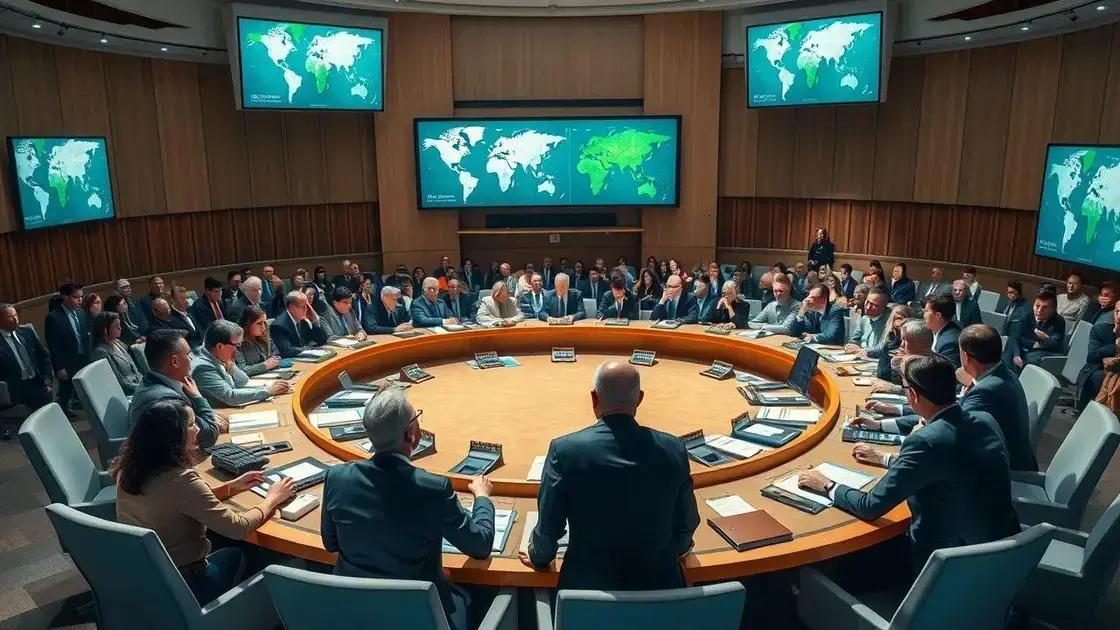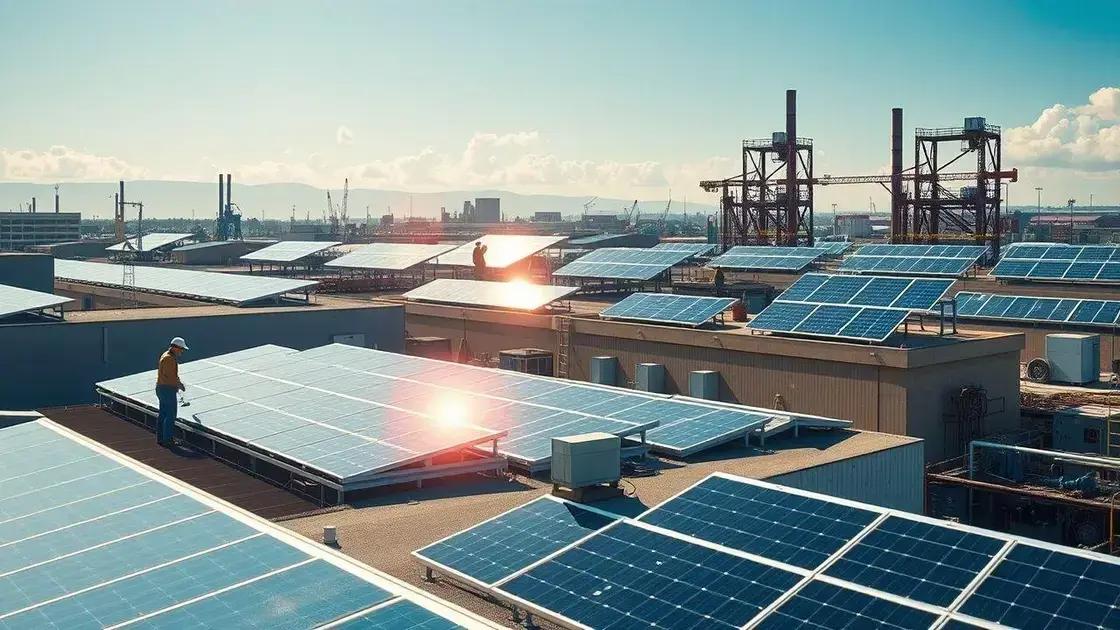Climate policy updates: Are we ready for change?

Climate policy updates focus on reducing emissions, promoting renewable energy, and engaging the public, addressing urgent environmental challenges while shaping future trends through technological innovations and increased ambition.
Every day, new climate policy updates emerge that could reshape our environment and communities. Wondering how these changes could affect you? Let’s dive in and explore.
Current global climate policy trends
As we navigate the challenges posed by climate change, understanding current global climate policy trends is essential. These trends guide nations in their efforts to combat environmental issues effectively.
International Agreements
One significant aspect of climate policy is the array of international agreements established to reduce greenhouse gases. These agreements aim to unite countries in their commitment to a sustainable future.
- Paris Agreement: Nearly all countries have pledged to limit global warming.
- Net Zero Goals: Many nations are setting targets to achieve net-zero emissions by 2050.
- Green Climate Fund: Financial support for developing nations is crucial for implementing climate policies.
Additionally, many regions are taking bold steps through local policies. For example, cities are adopting renewable energy sources, which reduce reliance on fossil fuels and help meet climate goals.
Governments are also focusing on stricter regulations for industries, pushing for cleaner technologies to minimize pollution. They work alongside businesses to promote sustainable practices.
Public Engagement
The role of public awareness cannot be understated. With increased concern over climate change, citizens are advocating for more aggressive policies. Social movements and campaigns have raised awareness about the urgency of acting on climate issues.
People are now more informed about their carbon footprints, leading to greater demand for transparency from companies. As a result, many businesses are responding by adopting sustainable practices.
Ultimately, current trends reflect a growing acceptance of the need for immediate action. Countries are shifting from mere discussions to concrete steps aimed at mitigating climate change.
Impact of recent climate policy changes
The impact of recent climate policy changes is profound, influencing both local communities and global actions. These changes aim to create a more sustainable future through various strategies and regulations.
Economic Effects
Shifts in climate policy often affect the economy. New regulations can lead to job creation in renewable energy sectors, such as solar and wind power. However, they may also disrupt traditional industries reliant on fossil fuels.
- Renewable energy jobs are expected to grow significantly.
- Fossil fuel industries may face job losses.
- Investment in green technologies is on the rise.
On the other hand, these changes encourage innovation. Businesses are compelled to adopt sustainable practices, leading to technological advancements that can benefit all sectors.
Social Considerations
Social impacts are also noteworthy. As countries implement new policies, communities begin to experience the effects of climate action. Urban areas often see improvements in air quality, which enhance public health.
Moreover, global climate policy changes promote environmental justice. They aim to reduce the disproportionate effects of climate change on vulnerable populations. For instance, low-income communities are often the hardest hit by climate disasters. Recent policies strive to address these inequalities.
Additionally, involvement in climate initiatives often brings people together. As communities participate in sustainability projects, they foster a sense of collective responsibility and empowerment.
Overall, recent climate policy changes reflect a critical shift in the approach to environmental challenges. The focus is not only on tackling climate change but also on building a more equitable and sustainable future.
How climate policies affect local industries

Climate policies significantly affect local industries, shaping how they operate and evolve. The introduction of regulations aimed at reducing emissions can lead to major changes in production processes.
Impact on Traditional Industries
Many traditional industries, such as manufacturing and fossil fuels, face increased pressure to adapt. Compliance with new regulations often requires investments in cleaner technologies. While this can be costly, it also opens the door for innovation and improvement in sustainability.
- Companies are adopting energy-efficient practices to reduce costs.
- Fossil fuel dependence is declining as alternative energy sources gain traction.
- Pressure to comply with regulations can lead to job restructuring.
These adaptations may result in temporary disruptions. However, they could ultimately strengthen the industry’s long-term viability by fostering resilience against environmental changes.
Emergence of Green Industries
In contrast, climate policies encourage the growth of green industries. Renewable energy sectors, like solar and wind, are thriving due to favorable regulations and incentives. This shift not only provides jobs but also contributes to a more sustainable economy.
Businesses focusing on sustainability are thriving as consumers demand more eco-friendly products. A recent study found that consumers are willing to pay more for goods from companies dedicated to environmental stewardship.
Further, local governments often provide financial incentives for green projects, driving the development of sustainable business models in the community. The emergence of these industries enhances local economic health while reducing environmental impact.
As industries adapt to climate policies, the economy as a whole becomes more dynamic and resilient. By fostering innovation and creating new jobs, these policies can significantly shape the future landscape of local economies.
Public opinion on climate policy updates
Public opinion on climate policy updates is a vital factor in shaping how these policies are implemented and received. As climate change becomes a more pressing issue, people’s views significantly influence government actions.
Growing Awareness
More individuals are becoming aware of climate issues due to media coverage and educational initiatives. This increased awareness often translates into a stronger demand for effective climate policies.
- Many citizens are now informed about the impacts of climate change on health and the environment.
- Public campaigns have successfully highlighted the importance of sustainability.
- Social media plays a key role in spreading information quickly.
This surge in awareness has led to heightened expectations for government accountability regarding climate actions.
Mixed Responses
Despite growing awareness, public opinion is mixed. Some people strongly support ambitious climate policies, while others express skepticism about their feasibility or extent.
Certain demographics may oppose climate regulations due to concerns over job security or economic implications. This divide can hinder progress. Leaders must navigate these varying opinions to create policies that acknowledge people’s fears while addressing climate change.
Additionally, organized interest groups often influence public views. For instance, environmental organizations advocate for strong climate actions, while industries reliant on fossil fuels may promote caution.
This dynamic shapes discussions surrounding climate policy updates and affects how governments frame their initiatives.
As public opinion evolves, policymakers will need to engage with communities to foster dialogue. This can lead to better-informed decisions and smoother implementations of climate initiatives.
Future predictions for climate policy
Future predictions for climate policy are critical as nations strive to combat climate change. Experts are making informed projections about how these policies will evolve over the coming years.
Increased Ambition
One major trend is the expectation of increased ambition in climate policies. As awareness grows, more countries are likely to adopt stronger targets to reduce greenhouse gas emissions.
- Countries may aim for net-zero emissions by 2050 or earlier.
- International cooperation is expected to strengthen, leading to more unified climate action.
- Emphasis on transparency and accountability will likely grow to monitor progress.
Such ambitious goals will require not only government commitment but also bottom-up engagement from businesses and communities.
Technological Innovations
Technological advancements will play a pivotal role in shaping climate policy. Innovations in renewable energy, carbon capture, and sustainable agriculture are anticipated to transform how climate goals are achieved.
Increased investment in green technologies will help lower costs and make clean energy more accessible. As new solutions emerge, effective policies will be essential to ensure these technologies are widely adopted.
Additionally, tech companies are likely to become key players, developing tools that support sustainability initiatives across various sectors.
Public Engagement and Education
As climate issues become more urgent, public engagement in climate policy is predicted to rise. Educational campaigns will be vital in raising awareness about climate change impacts and policy options.
Community involvement in sustainability efforts could lead to grassroots movements that push for more significant changes. Citizens may hold their governments accountable, demanding action and supporting policies that align with environmental goals.
Through active participation, the public can drive the momentum needed for more significant and meaningful climate policy changes.
In conclusion, the future of climate policy holds great promise as nations adapt to the pressing challenges of climate change. Predictions indicate that increased ambition, technological innovation, and public engagement will play crucial roles in shaping effective climate actions. As we move forward, it is essential for communities to participate actively in these policies to ensure a sustainable and equitable future for all. Together, we can drive change and make a significant impact in the fight against climate change.
FAQ – Frequently Asked Questions about Climate Policy Updates
What are the main goals of recent climate policy updates?
The main goals include reducing greenhouse gas emissions, promoting renewable energy, and enhancing sustainability efforts globally.
How do climate policies impact local industries?
Climate policies require industries to adapt by adopting cleaner technologies, which can lead to both challenges and opportunities for job creation.
What role does public opinion play in climate policy?
Public opinion significantly influences climate policy decisions, as governments must respond to the demands and concerns of their constituents.
What future trends can we expect in climate policy?
Future trends are expected to include increased ambition in emissions targets, technological innovations, and greater public engagement in sustainability initiatives.






